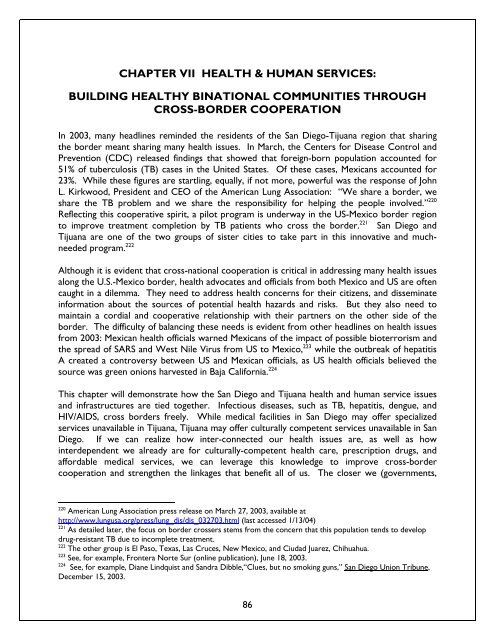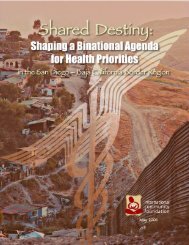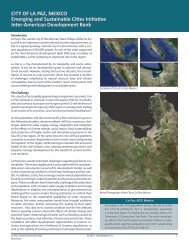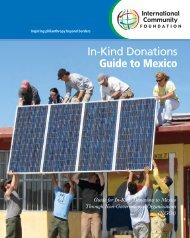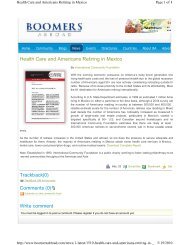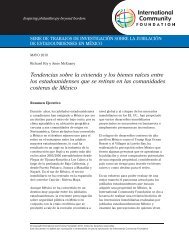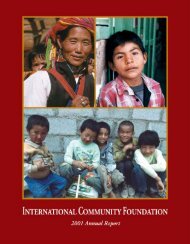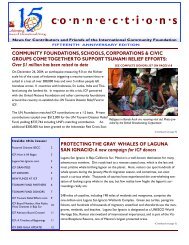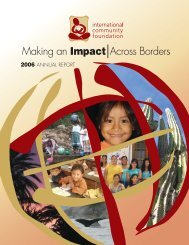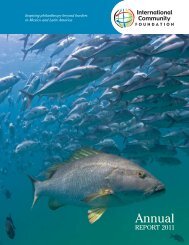Blurred Borders - International Community Foundation
Blurred Borders - International Community Foundation
Blurred Borders - International Community Foundation
Create successful ePaper yourself
Turn your PDF publications into a flip-book with our unique Google optimized e-Paper software.
CHAPTER VII HEALTH & HUMAN SERVICES:<br />
BUILDING HEALTHY BINATIONAL COMMUNITIES THROUGH<br />
CROSS-BORDER COOPERATION<br />
In 2003, many headlines reminded the residents of the San Diego-Tijuana region that sharing<br />
the border meant sharing many health issues. In March, the Centers for Disease Control and<br />
Prevention (CDC) released findings that showed that foreign-born population accounted for<br />
51% of tuberculosis (TB) cases in the United States. Of these cases, Mexicans accounted for<br />
23%. While these figures are startling, equally, if not more, powerful was the response of John<br />
L. Kirkwood, President and CEO of the American Lung Association: “We share a border, we<br />
share the TB problem and we share the responsibility for helping the people involved.” 220<br />
Reflecting this cooperative spirit, a pilot program is underway in the US-Mexico border region<br />
to improve treatment completion by TB patients who cross the border. 221 San Diego and<br />
Tijuana are one of the two groups of sister cities to take part in this innovative and muchneeded<br />
program. 222<br />
Although it is evident that cross-national cooperation is critical in addressing many health issues<br />
along the U.S.-Mexico border, health advocates and officials from both Mexico and US are often<br />
caught in a dilemma. They need to address health concerns for their citizens, and disseminate<br />
information about the sources of potential health hazards and risks. But they also need to<br />
maintain a cordial and cooperative relationship with their partners on the other side of the<br />
border. The difficulty of balancing these needs is evident from other headlines on health issues<br />
from 2003: Mexican health officials warned Mexicans of the impact of possible bioterrorism and<br />
the spread of SARS and West Nile Virus from US to Mexico, 223 while the outbreak of hepatitis<br />
A created a controversy between US and Mexican officials, as US health officials believed the<br />
source was green onions harvested in Baja California. 224<br />
This chapter will demonstrate how the San Diego and Tijuana health and human service issues<br />
and infrastructures are tied together. Infectious diseases, such as TB, hepatitis, dengue, and<br />
HIV/AIDS, cross borders freely. While medical facilities in San Diego may offer specialized<br />
services unavailable in Tijuana, Tijuana may offer culturally competent services unavailable in San<br />
Diego. If we can realize how inter-connected our health issues are, as well as how<br />
interdependent we already are for culturally-competent health care, prescription drugs, and<br />
affordable medical services, we can leverage this knowledge to improve cross-border<br />
cooperation and strengthen the linkages that benefit all of us. The closer we (governments,<br />
220<br />
American Lung Association press release on March 27, 2003, available at<br />
http://www.lungusa.org/press/lung_dis/dis_032703.html (last accessed 1/13/04)<br />
221<br />
As detailed later, the focus on border crossers stems from the concern that this population tends to develop<br />
drug-resistant TB due to incomplete treatment.<br />
222<br />
The other group is El Paso, Texas, Las Cruces, New Mexico, and Ciudad Juarez, Chihuahua.<br />
223<br />
See, for example, Frontera Norte Sur (online publication), June 18, 2003.<br />
224<br />
See, for example, Diane Lindquist and Sandra Dibble,“Clues, but no smoking guns,” San Diego Union Tribune,<br />
December 15, 2003.<br />
86


